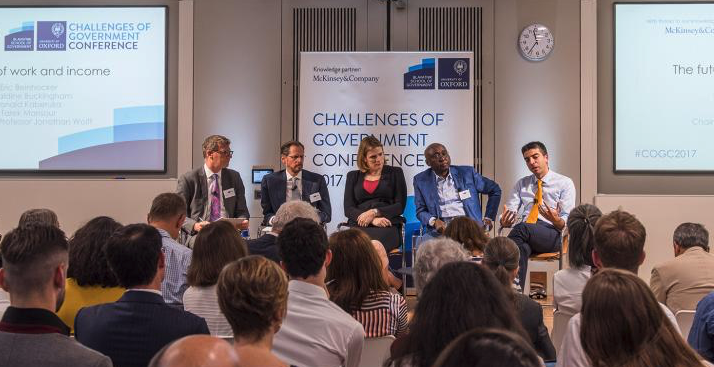How can government achieve better outcomes? Challenges of Government Conference 2018

The Challenges of Government Conference 2018: The Future of Government is the Blavatnik School's annual flagship event, which brings together the brightest minds in government, the private sector and academia to discuss policies, strategies and solutions to the world’s public policy challenges.
About the session
What matters to people is outcomes. How long will I survive after cancer treatment? How long can I hold down a job after sustained unemployment? How can I ensure my children are well educated? Yet the traditional means of public sector payment is centred on payment for processes and individual interventions like the number of teachers trained or the number of tumours removed, rather than an outcome.
One attempt to solve this is by government paying external providers from the private and non-profit sectors for outcomes achieved, rather than services delivered. It is an appealing idea, not least because it acknowledges that governments can’t achieve better outcomes for their citizens on their own. Outcomes-based payment schemes demand strong collaboration across different government departments, between private and non-profit sector and within institutions. Outcomes-based payment has several manifestations, including payment by results and social impact bonds. Many developed economies are testing these methods in a bid to drive public sector performance and efficiency: in the UK alone, payments by results accounts for an estimated £15 billion of public spending. The international development sector is starting to experiment too, through instruments like the development impact bond.
Payment for outcomes makes sense on paper. But what evidence is there that it actually delivers better value for money compared to traditional payment methods? Can it deliver a more responsive impact at a local level? Does sharing the financial risk between philanthropic, private investors and the state allow for greater innovation? This session will bring together experts who both advocate and challenge the roll-out of payment for outcomes, drawing on their many years of experience in the field.
About the speakers
Mara Airoldi, Director of the Government Outcomes Lab, will be leading the session.
Caroline Mason CBE is the CEO of Esmee Fairbairn, one of the largest independent grant makers in the UK. She has held the position of COO at Big Society Capital and Charity Bank. She is the co-founder of Investing for Good, a social investment advisory firm and one of the first Community Interest Companies. Prior to her career in the social sector, Caroline worked in creative and innovative product development in the financial services sector. She has her own consulting company, working with several financial institutions to develop new businesses and products including an electronic brokering service and global wealth management business for a private bank. She brings a wealth of experience from the financial and social sector.
Amel Karboul is CEO of The Education Outcomes Fund for Africa and the Middle East. This $1 billion Outcomes Fund seeks to transform education attainment in these regions by raising public and private investment and using development impact bonds to maximise outcomes. Amel has over 20 years experience collaborating with global corporate, non-profit and government leaders to release strategy, effective transformational change within communities and organisations. She was also the Minister for Tourism for the Tunisian Government in 2014. She brings an international perspective, having worked with a wide range of people from many cultures, industries and disciplines.